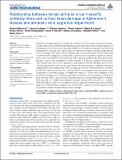Files in this item
Relationship between herpes simplex virus-1-specific antibody titers and cortical brain damage in Alzheimer's disease and amnestic mild cognitive impairment
Item metadata
| dc.contributor.author | Mancuso, Roberta | |
| dc.contributor.author | Baglio, Francesca | |
| dc.contributor.author | Agostini, Simone | |
| dc.contributor.author | Cabinio, Monia | |
| dc.contributor.author | Laganà, Maria M | |
| dc.contributor.author | Hernis, Ambra | |
| dc.contributor.author | Margaritella, Nicolò | |
| dc.contributor.author | Guerini, Franca R | |
| dc.contributor.author | Zanzottera, Milena | |
| dc.contributor.author | Nemni, Raffaello | |
| dc.contributor.author | Clerici, Mario | |
| dc.date.accessioned | 2022-03-15T15:30:05Z | |
| dc.date.available | 2022-03-15T15:30:05Z | |
| dc.date.issued | 2014-10-15 | |
| dc.identifier | 278278972 | |
| dc.identifier | 7c53b551-6f48-4829-95d3-ca8d11eafef9 | |
| dc.identifier | 25360113 | |
| dc.identifier | 84926683321 | |
| dc.identifier.citation | Mancuso , R , Baglio , F , Agostini , S , Cabinio , M , Laganà , M M , Hernis , A , Margaritella , N , Guerini , F R , Zanzottera , M , Nemni , R & Clerici , M 2014 , ' Relationship between herpes simplex virus-1-specific antibody titers and cortical brain damage in Alzheimer's disease and amnestic mild cognitive impairment ' , Frontiers in Aging Neuroscience , vol. 6 , 285 . https://doi.org/10.3389/fnagi.2014.00285 | en |
| dc.identifier.issn | 1663-4365 | |
| dc.identifier.other | PubMedCentral: PMC4197651 | |
| dc.identifier.uri | https://hdl.handle.net/10023/25051 | |
| dc.description | This work was supported by 2012–2014 Ricerca Corrente (Italian Ministry of Health). | en |
| dc.description.abstract | Alzheimer's disease (AD) is a multifactorial disease with a still barely understood etiology. Herpes simplex virus 1 (HSV-1) has long been suspected to play a role in the pathogenesis of AD because of its neurotropism, high rate of infection in the general population, and life-long persistence in neuronal cells, particularly in the same brain regions that are usually altered in AD. The goal of this study was to evaluate HSV-1-specific humoral immune responses in patients with a diagnosis of either AD or amnestic mild cognitive impairment (aMCI), and to verify the possible relation between HSV-1-specific antibody (Ab) titers and cortical damage; results were compared to those obtained in a group of healthy controls (HC). HSV-1 serum IgG titers were measured in 225 subjects (83 AD, 68 aMCI, and 74 HC). HSV-specific Ab avidity and cortical gray matter volumes analyzed by magnetic resonance imaging (MRI) were evaluated as well in a subgroup of these individuals (44 AD, 23 aMCI, and 26 HC). Results showed that, whereas HSV-1 seroprevalence and IgG avidity were comparable in the three groups, increased Ab titers (p < 0.001) were detected in AD and aMCI compared to HC. Positive significant correlations were detected in AD patients alone between HSV-1 IgG titers and cortical volumes in orbitofrontal (region of interest, ROI1 RSp0.56; p = 0.0001) and bilateral temporal cortices (ROI2 RSp0.57; p < 0.0001; ROI3 RSp0.48; p = 0.001); no correlations could be detected between IgG avidity and MRI parameters. Results herein suggest that a strong HSV-1-specific humoral response could be protective toward AD-associated cortical damage. | |
| dc.format.extent | 8 | |
| dc.format.extent | 1457601 | |
| dc.language.iso | eng | |
| dc.relation.ispartof | Frontiers in Aging Neuroscience | en |
| dc.subject | HSV-1 | en |
| dc.subject | Alzheimer’s disease (AD) | en |
| dc.subject | Amnestic mild cognitive impairment (aMCI) | en |
| dc.subject | Magnetic resonance imaging (MRI) | en |
| dc.subject | Voxel based morphometry (VBM) | en |
| dc.subject | HSV-1 IgG | en |
| dc.subject | QR355 Virology | en |
| dc.subject | RC0321 Neuroscience. Biological psychiatry. Neuropsychiatry | en |
| dc.subject.lcc | QR355 | en |
| dc.subject.lcc | RC0321 | en |
| dc.title | Relationship between herpes simplex virus-1-specific antibody titers and cortical brain damage in Alzheimer's disease and amnestic mild cognitive impairment | en |
| dc.type | Journal article | en |
| dc.contributor.institution | University of St Andrews. Statistics | en |
| dc.identifier.doi | 10.3389/fnagi.2014.00285 | |
| dc.description.status | Peer reviewed | en |
This item appears in the following Collection(s)
Items in the St Andrews Research Repository are protected by copyright, with all rights reserved, unless otherwise indicated.

